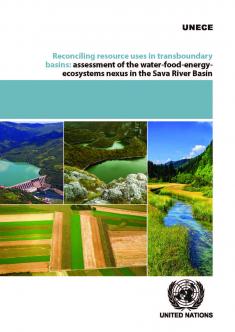Coordination between the water, energy, food and environment sectors is fraught with difficulties at the national level and the complexity increases substantially in transboundary basins. The “nexus approach” to managing interlinked resources has emerged as a way to enhance water, energy and food security by increasing efficiency, reducing trade-offs, building synergies and improving governance while protecting ecosystems.
This technical report contains results of the nexus assessment of the Sava River Basin shared by Bosnia and Herzegovina, Croatia, Montenegro, Serbia and Slovenia that was carried out from 2014 to 2016 in the framework of the UNECE Water Convention’s Programme of Work. The methodology employed was developed specifically for assessing the nexus in transboundary basins.
The assessment aimed to foster transboundary cooperation by identifying intersectoral synergies and determining measures that could alleviate tensions related to the multiple needs of the riparian countries for common resources. The process looked to generate relevant information to support decision-making, and it engaged diverse expertise and key actors in the basins. The participatory assessment process for the Sava River Basin involved an intersectoral workshop for identification of the main intersectoral issues and possible solutions, detailed by a subsequent analysis, and followed by consultations of the various sectoral authorities concerned.
This nexus assessment describes the characteristics of the water, food and land, energy and ecosystem services, and their governance. The assessment shows multiple linkages in the Sava River Basin between the different basin resources, and concludes that strengthening transboundary cooperation on the integrated management of these resources will bring real benefits. Graphics illustrate the interlinkages identified. Climate change and socioeconomic drivers, and their effects on intersectoral dynamics, are also considered. Finally, a broad range of beneficial response actions are outlined. Solutions proposed span institutions, information, instruments, infrastructure as well as international coordination and cooperation.
The Sava nexus assessment identifies a number of benefits both related to and independent of economic activities that are generated by improvements in the management of the basin’s resources as well as by the enhanced trust between the Sava countries.
ECE/MP.WAT/NONE/3
This technical report contains results of the nexus assessment of the Sava River Basin shared by Bosnia and Herzegovina, Croatia, Montenegro, Serbia and Slovenia that was carried out from 2014 to 2016 in the framework of the UNECE Water Convention’s Programme of Work. The methodology employed was developed specifically for assessing the nexus in transboundary basins.
The assessment aimed to foster transboundary cooperation by identifying intersectoral synergies and determining measures that could alleviate tensions related to the multiple needs of the riparian countries for common resources. The process looked to generate relevant information to support decision-making, and it engaged diverse expertise and key actors in the basins. The participatory assessment process for the Sava River Basin involved an intersectoral workshop for identification of the main intersectoral issues and possible solutions, detailed by a subsequent analysis, and followed by consultations of the various sectoral authorities concerned.
This nexus assessment describes the characteristics of the water, food and land, energy and ecosystem services, and their governance. The assessment shows multiple linkages in the Sava River Basin between the different basin resources, and concludes that strengthening transboundary cooperation on the integrated management of these resources will bring real benefits. Graphics illustrate the interlinkages identified. Climate change and socioeconomic drivers, and their effects on intersectoral dynamics, are also considered. Finally, a broad range of beneficial response actions are outlined. Solutions proposed span institutions, information, instruments, infrastructure as well as international coordination and cooperation.
The Sava nexus assessment identifies a number of benefits both related to and independent of economic activities that are generated by improvements in the management of the basin’s resources as well as by the enhanced trust between the Sava countries.
ECE/MP.WAT/NONE/3
